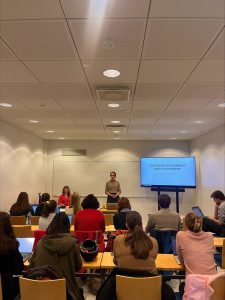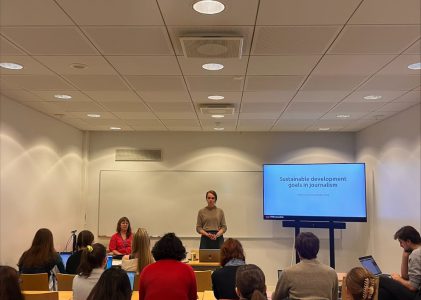Interview technique can make all the difference in the quality of your data. This is an example of two active interviews conducted to learn more about sustainable media development at a course on Communication for development.
Introduction
The aim of this assignment was conduct two interviews, one in person and one online. As I want to write my thesis on sustainable media development, I decided to interview two representatives from suitable organisations working with aid funded media development in low and middle income countries.
This was an opportunity to inform myself, in order to be able to in future put together a relevant questionnaire with regards to sustainable media development.
I wrote three open questions for my interviews, which I then added follow up questions to as we went along.
They were:
What would you put into the term “Sustainable Media Development”?
What is the biggest impact that your organisation achieves today when it comes to sustainable development?
What are you doing specifically to address issues of sustainability within your own organisation?
What I wanted to understand was how the interviewees view the scope and the subject of Sustainable media development. What do they put into the term? Was there something that I had not even thought of? With the second question I wanted to ascertain how the organisations viewed their own role when it comes to sustainable media development and finally to hear what sort of initiatives they are taking to “green” their own operations.
Seizing an opportunity
On UN-day, the 24th of October, I was doing a guest lecture at the University of Tampere in Finland, on the sustainable development goals and journalism. As it was the first lecture of a new iteration of the elective masters course on Sustainable journalism, I had heard that the new manager of Vikes would be present there, as they are funding the course. Vikes is an organisation working with media development which currently delivers most of the Finnish national aid programme for supporting journalism in low and middle income countries, such as Somalia, Myanmar and Kenya.
Marjo Heinonen recently joined the organisation as Managing Director of Vikes and as she was present during the day, I requested a short interview. My own organisation Fojo Media Institute and Vikes are potential partner organisations, so it was an important meeting for both parties. I did consider the ethical aspects, but decided to do the interview, as there was no danger of exploitation by the interviewee, seeing as she was senior to me in terms of status in her organization and there were not issues of dependency. Also, as we are not currently partner organisations, even if the wish is there from both sides.

Similarities and differences
The second interview was with Anja Weber, of Deutche Welle Akademie. DW is the public service broadcaster in Germany, which for the last 15 years have been working with delivering training and development funded by the German international aid budget (much like BBC Media Action and SR MDO). Weber is a senior M&E advisor who works with monitoring and evaluation of DWAs programmes. I booked the interview by emailing DW Akademie asking for their best person to answer questions on sustainable media development.
The two interviews were quite similar. I was surprised that I did not feel very different doing an online interview compared to one face to face. Irwine (2012) refers to face-to-face as opposed to telephone interview. All of this referencing is pre-pandemic. As long as the connection is good and sound and image works flawlessly, as it did in this case, I feel that we have got so used to online meetings that it is not very different from meeting in person. The openness of the interviews and willingness to explore issues, were the same in both interviews. This was also a very “active interview” (Holstein, 2020) where all parties were curious to inform themselves and went in to the interview situation unconditionally.
It is striking how western organisations working with media development have evolved in a similar fashion, producing very similar interventions within very similar frameworks. One reason for this is of course the aims and strategies of the donors, which consist primarily of the development agencies of national governments, but it seems that methods in terms of creating sustainability and resilience are also similar, if not identical.
Personal learning and conclusions
The interviews were very important in terms of informing me about what is the perception of other media development organisations when it comes to sustainable media development. Having come across the strategies and implementation of projects by Internews, Irex, BBC Media Action, IMS and SRMDO, I feel I know the field and how the organisaitons work with sustainability, but interviewing two people from two organisations that I have not been much in contact with was very useful. This knowledge will be crucial for me, in making questionnaires for the data collection for my thesis.
Both of the interviews with Vikes and DW were very open, honest and curious about the subject. Neither of the two interviewees claimed to have deeper knowledge when it comes to sustainability in media development, but both spoke of resilience in terms of programme design and implementation, strategic documents (such as environment and gender policies) and a sense that the issue of sustainability is one that is becoming more and more important.
Both organisations have become more aware of the impact of travel. In the case of Vikes, travel is conducted with a thought of combining several journeys into one, staying longer periods of time in partner countries and minimising the number of employees in each program. In DW there were similar ideas, and also restrictions on domestic travel (implemented by the public service organisation as a whole).
References
Enghel, Florencia & Noske-Turner, Jessica (Eds) (2018) Communication in International Development: Doing Good or Looking Good? Oxon: Routledge.
Holstein, J. A., & Gubrium, J. F. (2011). Constructing Meaning Within the Interview. In The Active Interview. SAGE Publications. https://doi.org/10.4135/9781412986120
Holstein, J. A., & Gubrium, J. F. (2011). Introduction. In The active interview. SAGE Publications.https://doi.org/10.4135/9781412986120
Holstein, J. A., & Gubrium, J. F. (2011). Multivocality and Multiple Respondents. In The Active Interview.SAGE Publications. https://doi.org/10.4135/9781412986120
Holstein, J. A., & Gubrium, J. F. (2011). Rethinking interview procedures. In The active Interview. SAGE Publications. https://doi.org/10.4135/9781412986120
Irvine, A., Drew, P., & Sainsbury, R. (2012). “Am I not answering your questions properly?” Clarification, Adequacy, and Responsiveness in Semi-structured Telephone and Face-to-face interviews. Qualitative Research, 13(1), 87–106. SAGE Publications. https://doi.org/10.1177/1468794112439086


